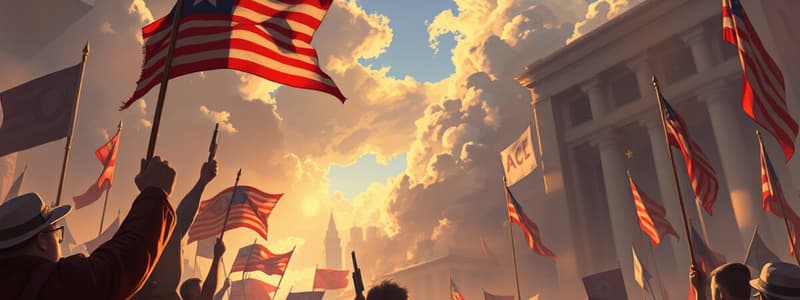Podcast
Questions and Answers
What is the difference between civil rights and civil liberties?
What is the difference between civil rights and civil liberties?
- Civil liberties are protections against government. (correct)
- Civil rights are guaranteed by the constitution.
- Civil liberties ensure equality and prevent discrimination. (correct)
- Civil rights protect against government issues.
What is the doctrine of incorporation?
What is the doctrine of incorporation?
The application of the Bill of Rights protections to the states via the 14th amendment.
Give two examples of discriminatory congressional acts.
Give two examples of discriminatory congressional acts.
The Sedition Act and the Espionage Act.
What in the 14th amendment serves as the protection?
What in the 14th amendment serves as the protection?
What is the key question when determining rights that should be protected?
What is the key question when determining rights that should be protected?
What is selective incorporation?
What is selective incorporation?
Give an example of a limit placed on freedom of speech.
Give an example of a limit placed on freedom of speech.
What are the four types of speech that may or may not be fully protected?
What are the four types of speech that may or may not be fully protected?
What is the exclusionary rule?
What is the exclusionary rule?
What is the Miranda ruling?
What is the Miranda ruling?
American courts try foreign criminals such as terrorists.
American courts try foreign criminals such as terrorists.
Flashcards
Civil Liberties
Civil Liberties
Rights protecting individuals from government control, guaranteed by law.
Civil Rights
Civil Rights
Government actions to prevent discrimination, ensuring equal rights.
Doctrine of Incorporation
Doctrine of Incorporation
Applying Bill of Rights protections to state governments using the 14th Amendment.
Selective Incorporation
Selective Incorporation
Signup and view all the flashcards
14th Amendment Protections
14th Amendment Protections
Signup and view all the flashcards
Fundamental Rights
Fundamental Rights
Signup and view all the flashcards
Exclusionary Rule
Exclusionary Rule
Signup and view all the flashcards
Miranda Ruling
Miranda Ruling
Signup and view all the flashcards
Clear and Present Danger
Clear and Present Danger
Signup and view all the flashcards
Limited Speech Types
Limited Speech Types
Signup and view all the flashcards
American Courts & Foreign Criminals
American Courts & Foreign Criminals
Signup and view all the flashcards
Sedition Act
Sedition Act
Signup and view all the flashcards
Study Notes
Civil Rights vs. Civil Liberties
- Civil liberties are inherent rights that protect individuals from government overreach, guaranteed by the Constitution and judicial rulings.
- Civil rights involve positive governmental actions aimed at preventing discrimination, ensuring equal protection under the law.
Doctrine of Incorporation
- Uses the 14th Amendment to extend Bill of Rights protections to state governments.
- Example: In Gitlow v. New York (1925), the Supreme Court ruled that free speech protections apply to state actions.
Discriminatory Congressional Acts
- Sedition Act: Criminalized negative communication against the government, contributing to the imprisonment of Eugene V. Debs.
- Espionage Act: Focused on making false statements about the military and governmental actions.
14th Amendment Protections
- Emphasizes due process and ensures no individual is denied equal protection under the law.
- States cannot engage in unreasonable discrimination against people within their jurisdiction.
Fundamental Rights Determination
- The core question in rights protection: which rights are fundamental enough to influence state governance?
Selective Incorporation
- The judicial process whereby parts of the Bill of Rights are applied to state laws through court rulings.
- Ensures citizens receive the rights specified in the Bill of Rights at the state level.
Limits on Freedom of Speech
- Clear and present danger doctrine restricts speech that poses an imminent threat.
- Example: Schenk v. United States, where advocacy of harmful actions led to imprisonment.
Types of Speech and Their Protections
- Certain types of speech are not fully protected, including:
- Defamation: Making false statements that harm a person's reputation.
- Flag burning: Considered offensive, lacking artistic or literary value.
- False advertising: Misleading consumers for profit.
- Symbolic speech: Political actions that convey messages may have varying degrees of protection.
Exclusionary Rule
- Prohibits the use of evidence obtained illegally during criminal trials.
- Aims to protect individuals’ rights and ensure fair judicial processes.
Miranda Ruling
- Requires law enforcement to inform suspects of their rights to silence and legal counsel during interrogations.
- Established to protect against self-incrimination.
American Courts and Foreign Criminals
- Courts can prosecute foreign criminals, including terrorists, under unlawful coalition provisions.
- Ensures accountability for crimes that cross international boundaries.
Studying That Suits You
Use AI to generate personalized quizzes and flashcards to suit your learning preferences.




